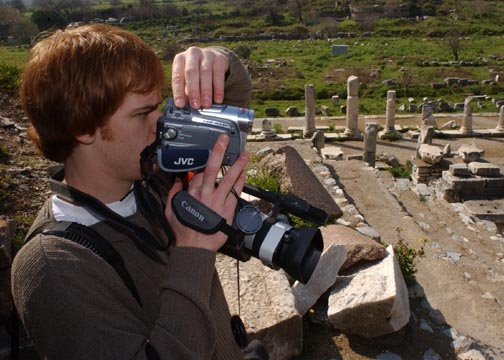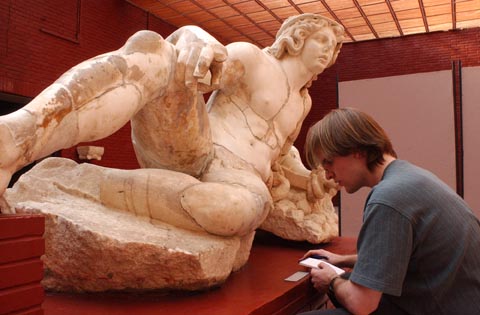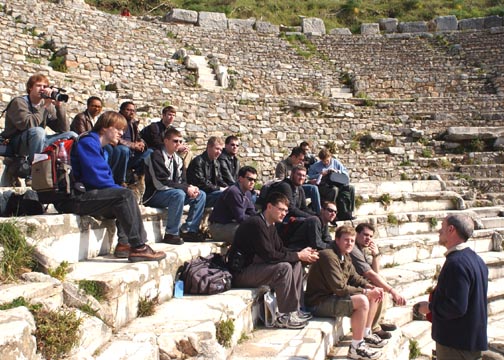 Ben Farone shoots digital video at Selcuk |
A Wabash College class studying ancient Christian culture arrived in Turkey on Saturday, March 8. Justin Lyon, director of new media at Wabash, and Todd Vogel ’04, are following the class up and down the western coast of Turkey and are sending back journal entries and photographs. What follows is Lyon's first journal entry:
"None of it connects until you're there" said Gary Moore over dinner in Selcuk, Turkey. There was no menu so we ordered our food from a glass case that faced the street.
For about $8 each, we tried dishes such as ante (a spicy dip); gingene (a salad of cheese, tomatoes, mint and onions); cacik (yogurt with garlic that we ate like a soup); freshly caught grilled sardalya (large sardines); and lamb shish kebabs.
 Eating dinner in Selcuk, Turkey |
We drank bottled water with raki, an anise flavored spirit referred to as lion's milk, cheap beer, and coke. This completed our first day of exploration of the ruins of Ephesus.
Wabash students spent their first nine hours at Ephesus taking hundreds of photographs and filming hours of video. The four groups made their way back and forth across the ruins, framing the perfect shot of the library of Celsus, translating ancient Greek and Latin inscriptions, pulling Professor Bob Royalty aside to clarify questions and envisioning how they would pull their respective works together.
Walking down the Marble Way towards the old harbor, silted up and far from the current coastline, the students tread with the ghosts of emperors, slaves, gladiators, and whores.
The weather is perfect; sunny yet cool.
Readings that were once foreign and far-away are now close and personal.
"But when I saw the sacred house of Artemis that towers to the clouds, the [other Wonders of the World] were placed in the shade, for the Sun himself has never looked upon its equal outside Olympus," said the Antipater of Sidon.
The temple may be gone, the details of its construction and beauty forever lost, but the ancient city's sweeping grandeur still remain.
 Joe Warfel studying a statue in Selcuk |
That night the Wabash men set out to wander the town in search of exotic excitement and conversation. They found it at bars like "The Pink Bistro" where over 60 local men screamed as two soccer teams fought. It was not until later, after the game, that women began to appear in the bars; the testosterone fueled competition and cultural norms drove them away.
Ron Kelsey and Ben Faraone befriended two Turkish men who took them to a bar. While drinking Efes, a Turkish beer, the Turks asked if we were American soldiers.
Ron proudly pulled out his Army reserve ID and showed it to them. They looked at it carefully and high-fived Ron; all Turkish men must serve in the military and they respect fighting men.
Naturally the conversation turned to Iraq and the impending war. The Turkish parliament had just voted to allow America to use their land bases; papers carried front-page pictures and conversation turned quickly to current events.
"I spit on George W. Bush," one of the Turkish men vehemently declared, turning his head and spitting on the floor.
While the language barrier makes deep discourse difficult, it was clear that as much as they disliked our president, they held no fond thoughts for Sadaam or Osama bin Laden. They spoke carefully and with strong feelings of the economic hardships their country faced after the first Gulf War and their fears that history would repeat.
 Professor Bob Royalty lectures his class at the Theater in Selcuk |
The Wabash men retired that evening putting faces to the people whom our nation's actions would gravely impact. The detachment and dehumanization that comes with watching tragedy faded away; these were real men, expressing hope for their future and fearing it would never come.
Tomorrow we re-visit Ephesus in hope of gaining access to some of the closed portions of the ruins.
Sent from Selcuk, Turkey on 3/09/03
For more information see: